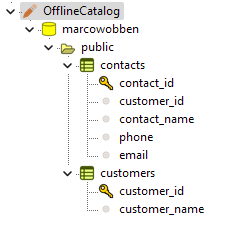Difference between revisions of "JCatalog"
m |
m |
||
| (7 intermediate revisions by the same user not shown) | |||
| Line 1: | Line 1: | ||
An example of a jcatalog file is printed below. This is an example output using the jdbcExplorer embedded in CaseTalk. These jCatalog files can be stored in your roaming profile (AppData) to be used by CaseTalk next time you open the [[Modeler:12/RepositorySql|Data Explorer]]. | An example of a jcatalog file is printed below. This is an example output using the jdbcExplorer embedded in CaseTalk. These jCatalog files can be stored in your roaming profile (AppData) to be used by CaseTalk next time you open the [[Modeler:12/RepositorySql|Data Explorer]]. | ||
These are automatically created by CaseTalk when configuring a JDBC Connection. But can also be created manually by your database administrator by running the following commandline: | |||
java -cp "jdbcMetaData.jar;<your-jdbc-driver.jar>" com.casetalk.JdbcMetaData -c"connectionstring" -u"username" -p"password" -s"schema" | |||
With a similar commandline the JDBC driver can be used to query the database as well. | |||
java -cp "jdbcMetaData.jar;<your-jdbc-driver.jar>" com.casetalk.JdbcMetaData -c"connectionstring" -u"username" -p"password" -s"schema" [select statement] | |||
Naturally, the offline metadata results cannot be queried for actual data, but it can be used in documenting offline catalog information or use it for reverse engineering and lineage mapping, through drag and drop. | |||
And if needed, even Mendix can be extracted using: | |||
https://github.com/casetalk/3rd-Party/tree/master/Mendix | |||
[[File:DataExplorerOfflineCatalog.png]] | |||
The content of the jCatalog file (as generated by the JdbcExplorer) displayed above is: | |||
{ | { | ||
| Line 109: | Line 126: | ||
"user": "admin" | "user": "admin" | ||
} | } | ||
[ | |||
= Manual = | |||
If crafting such a file by hand, or automated, some details can be skipped leading to a slimmer jcatalog file: | |||
{ | |||
"connection": { | |||
"catalogs": [{ | |||
"name": "marcowobben", | |||
"schemas": [ | |||
{ | |||
"name": "public", | |||
"tables": [ | |||
{ | |||
"columns": [ | |||
{ | |||
"name": "contact_id" | |||
}, | |||
{ | |||
"name": "customer_id" | |||
}, | |||
{ | |||
"name": "contact_name" | |||
}, | |||
{ | |||
"name": "phone" | |||
}, | |||
{ | |||
"name": "email" | |||
} | |||
], | |||
"name": "contacts", | |||
"primarykey": { | |||
"columns": [{ | |||
"column": "contact_id", | |||
"position": "1" | |||
}], | |||
"name": "contacts_pkey" | |||
} | |||
}, | |||
{ | |||
"columns": [ | |||
{ | |||
"name": "customer_id" | |||
}, | |||
{ | |||
"name": "customer_name" | |||
} | |||
], | |||
"name": "customers", | |||
"primarykey": { | |||
"columns": [{ | |||
"column": "customer_id", | |||
"position": "1" | |||
}], | |||
"name": "customers_pkey" | |||
} | |||
} | |||
] | |||
} | |||
] | |||
}] | |||
} | |||
} | |||
Latest revision as of 08:06, 7 November 2025
An example of a jcatalog file is printed below. This is an example output using the jdbcExplorer embedded in CaseTalk. These jCatalog files can be stored in your roaming profile (AppData) to be used by CaseTalk next time you open the Data Explorer.
These are automatically created by CaseTalk when configuring a JDBC Connection. But can also be created manually by your database administrator by running the following commandline:
java -cp "jdbcMetaData.jar;<your-jdbc-driver.jar>" com.casetalk.JdbcMetaData -c"connectionstring" -u"username" -p"password" -s"schema"
With a similar commandline the JDBC driver can be used to query the database as well.
java -cp "jdbcMetaData.jar;<your-jdbc-driver.jar>" com.casetalk.JdbcMetaData -c"connectionstring" -u"username" -p"password" -s"schema" [select statement]
Naturally, the offline metadata results cannot be queried for actual data, but it can be used in documenting offline catalog information or use it for reverse engineering and lineage mapping, through drag and drop.
And if needed, even Mendix can be extracted using:
https://github.com/casetalk/3rd-Party/tree/master/Mendix
The content of the jCatalog file (as generated by the JdbcExplorer) displayed above is:
{
"connection": {
"catalogs": [{
"name": "marcowobben",
"schemas": [
{
"name": "public",
"tables": [
{
"columns": [
{
"autoinc": "YES",
"datatype": "int4",
"name": "contact_id",
"nullable": "NO",
"position": "1",
"precision": "10",
"size": "10"
},
{
"datatype": "int4",
"name": "customer_id",
"nullable": "YES",
"position": "2",
"precision": "10",
"size": "10"
},
{
"datatype": "varchar",
"name": "contact_name",
"nullable": "NO",
"position": "3",
"precision": "10",
"size": "255"
},
{
"datatype": "varchar",
"name": "phone",
"nullable": "YES",
"position": "4",
"precision": "10",
"size": "15"
},
{
"datatype": "varchar",
"name": "email",
"nullable": "YES",
"position": "5",
"precision": "10",
"size": "100"
}
],
"foreignkeys": [{
"columns": [{
"column": "customer_id",
"position": "1",
"ref_column": "customer_id"
}],
"name": "fk_customer",
"ref_table": "customers"
}],
"name": "contacts",
"primarykey": {
"columns": [{
"column": "contact_id",
"position": "1"
}],
"name": "contacts_pkey"
}
},
{
"columns": [
{
"autoinc": "YES",
"datatype": "int4",
"name": "customer_id",
"nullable": "NO",
"position": "1",
"precision": "10",
"size": "10"
},
{
"datatype": "varchar",
"name": "customer_name",
"nullable": "NO",
"position": "2",
"precision": "10",
"size": "255"
}
],
"name": "customers",
"primarykey": {
"columns": [{
"column": "customer_id",
"position": "1"
}],
"name": "customers_pkey"
}
}
]
}
]
}],
"string": "jdbc:postgresql://192.168.1.106:5432/marcowobben"
},
"createdon": "2023-04-25T11:27:34.795546700Z",
"user": "admin"
}
Manual
If crafting such a file by hand, or automated, some details can be skipped leading to a slimmer jcatalog file:
{
"connection": {
"catalogs": [{
"name": "marcowobben",
"schemas": [
{
"name": "public",
"tables": [
{
"columns": [
{
"name": "contact_id"
},
{
"name": "customer_id"
},
{
"name": "contact_name"
},
{
"name": "phone"
},
{
"name": "email"
}
],
"name": "contacts",
"primarykey": {
"columns": [{
"column": "contact_id",
"position": "1"
}],
"name": "contacts_pkey"
}
},
{
"columns": [
{
"name": "customer_id"
},
{
"name": "customer_name"
}
],
"name": "customers",
"primarykey": {
"columns": [{
"column": "customer_id",
"position": "1"
}],
"name": "customers_pkey"
}
}
]
}
]
}]
}
}
